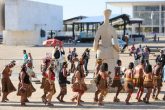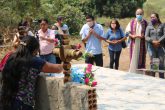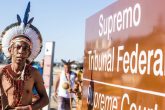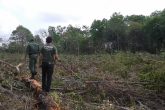Report No. 913: Human Rights Commission verifies misery and lack of assistance among the Guarani of Mato Grosso do Sul
The CDDPH Commission Report confirms the grave accusations of rights violations and presents 19 recommendations to the National Foundation for Indigenous Affairs (FUNAI), the Federal Police, the government of Mato Grosso do Sul and other organs/agencies.
The indigenous Guarani-Kaiowá and Guarani Ñandeva of Mato Grosso do Sul live in precarious situations, with high indices of violence, lack of assistance and access to basic services of health and safety. The data are part of the report presented by Ivan Marques, of the Program for the Protection of Human Rights Defenders on the afternoon of May 12, in the Council of Defense of Rights of the Human Person (CDDPH) in the Ministry of Justice in Brasília.
The report is the result of a visit by a special commission of the CDDPH to Dourados, Mato Grosso do Sul (MS) in March of this year. On that occasion, the group visited the communities of Passo Pirajú and Ñanderu Laranjeira, where information was collected about denunciations of human rights violations carried out against the indigenous peoples.
In general, the document points out what several reports have already denounced: that there are deadly land conflicts in the area; that the indigenous peoples were driven from their traditional lands, often being forced to live on the roadside, suffering from lack of basic sanitation, drinking water and access to basic health services and education; that they are constantly threatened and face discrimination and reprisals from the population and on the part of the police.
Passo Pirajú
In the visit to Passo Pirajú, which is a community approximately 20 miles from the center of Dourados and amid rural land holdings, the commission was able to experience first hand the reality of the 16 families living in the area. They were received by the local leaders Carlitos de Oliveira and Valmir Rodrigues.
They reported the conditions of misery to which they are subjected "the first fact that must be noted is that the lands occupied are in litigation, which [according to policy] prevents the local government from providing basic assistance services to the residents", the report points out. According to the document there is also great economic interest in relation to land due to the massive advance of sugar cane plantations.
The community survives on basic food baskets delivered by the Federal Government. However, during the visit, they heard grievances that some families are left out and do not receive this benefit. There are also reports of water supply problems and problems arising from lack of basic infrastructure, education and health and high indices of violence, disrespect for cultural customs and the freedom of movement (ingress and egress).
Laranjeira Ñanderú
A similar situation was found during the visit to Laranjeira Ñanderú community, which remains (where it was located by authorities at the time of eviction) on the edge of federal highway BR-163, in a highway rain drainage area. In the area, there live approximately 300 people, about 85 of whom are children. The indigenous peoples are living in shacks made of black plastic, which are situated between the road and barbed wire fences of the fazenda Santo Antonio.
As in Passo Pirajú, the community survives on basic food baskets provided by FUNAI and the Federal Government. These undustrialized and processed foods are not part of the traditional Guarani diet, which brings along health consequences. The water utilized for consumption comes from wells dug in the encampment. During floods caused by heavy rains the water is contaminated by pesticides used on the farm crops and by waste from the community itself. The community lacks even minimal sewage and clean water infrastructure.
The commission was received in traditional celebration, as is the custom of the Guarani-Kaiowá and Ñandeva people, who even in precarious situations sustain their spirituality and hope for Yvy Marë-ÿ, Guarani for ‘the land without evils’. Faride de Lima, leader of the community, reported the difficulties faced by the indigenous people at the site, such as constant risk of being run over due to the proximity to BR-163 and lack of medical assistance, among other concerns.
The group also took the opportunity to report the kidnapping of two indigenous teachers, the body of only one having been found, and also to demand action from the government on the two deaths.
Recommendations
In the report, the committee presents 19 recommendations to the National Foundation for Indigenous Affairs (FUNAI), the Federal Police, the government of Mato Grosso do Sul and other organs, among them the request that the "Ministry of Justice send the forces necessary for the guaranteed safety of the indigenous peoples mobilized in reclaiming of their territory, against the practices of violence on the part of the landowners of the region".
The document further solicits of the Federal Police and the Ministério Público Federal (office of the federal prosecutor) that they investigate and take action in relation to the cases of discriminatory campaigns against the indigenous peoples and also solicit from the National Department of Infrastructure and Transportation (DNIT) and the Attorney General (AGU) information about negotiations for the removal of the community of Laranjeira Ñanderú from the edge of BR-163.
The commission also recommends that the Funai prioritize the situation [in the state] of Mato Grosso do Sul, mobilizing financial resources, public service employees, and federal prosecutors so they are able to dedicate themselves exclusively to the process of indigenous territorial demarcation.
Special Commission
Composing the special commission that conducted the visit to Dourados: Ivan Marques, the Citizens National Ombudsman; Fermino Fechio, Juliana Miranda and Percílio de Sousa Lima of the CDDPH, and Rosângela Carvalho, of the Ministry of Social Development.
During the visit, the special commission was supported by the attorney from the Indigenous Missionary Council of the Mato Grosso do Sul Region, Rogério Batalha; Marco Antônio Delfino of the Public Prosecutors Office in Dourados; and anthropologists Antônio Brand, Kátia Vieta and Levi Pereira.






